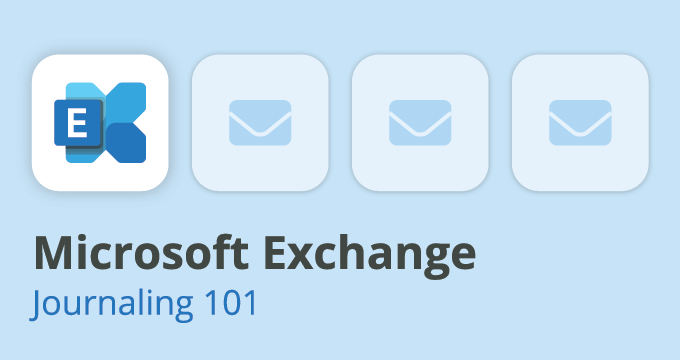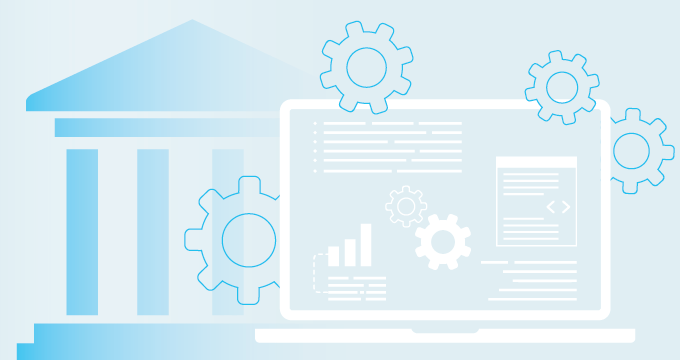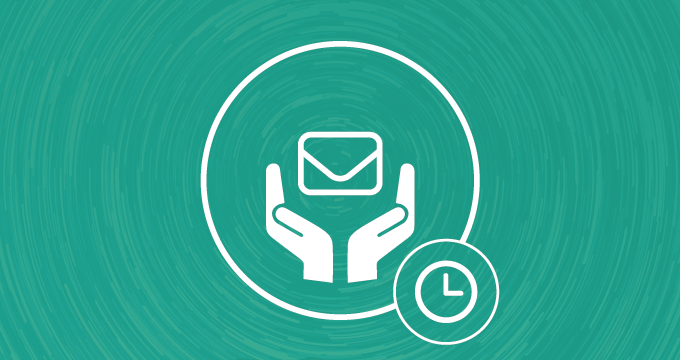Business emails often hold crucial and sensitive details about various aspects of your operations, such as initiatives, products, services, customer data, or performance metrics.
Considering the significance of these discussions, it’s essential to establish and maintain a comprehensive email archive.
Having an archive in place allows for flexibility to review your email communications at any given time.
One effective way to create and maintain this email archive within your organization is through the use of the Microsoft Exchange Journaling feature.
Knowing how Exchange journaling works and its importance is a vital part of keeping your organization compliant with email retention laws.
In this article we will be covering:
- What is email journaling and how it differs from email archiving.
- What is Exchange journaling and how it works.
- The advantages and best practices of Exchange journaling.
- Why combining your Exchange journal with an email archive is important.
Let’s get started.
What Is Email Journaling?
Email journaling is the process of creating shadow copies of all incoming and outgoing emails and storing them in their mailbox indefinitely.
With email journaling, the entire email content is captured, together with its sender, recipient, timestamps, attachments, and other relevant details.
All of this data is then stored on your main server in a separate inbox where it can’t be manipulated.
It sounds a lot like email archiving, but there are subtle differences.
How is email journaling different from email archiving?
Both email journaling and archiving are essential parts of your organization’s ability to manage email communications, but they do it in two different ways.
On the one hand, email journaling automatically copies all email communications and stores them on your server.
On the other hand, email archiving automatically captures email and stores it on a completely different server (usually the cloud).
This means that email journaling essentially doubles your data, requiring much more storage space on your primary server. With email archiving, you don’t have to worry about it.
In terms of security, emails in the journal mailbox can be deleted by users with higher administrative access while emails in the archive can only be deleted when their retention policy expires.
Email archives also give a much better and faster email ediscovery experience than email journaling, which makes them a better tool for regulatory compliance.
| Related: Email Archiving vs. Email Journaling – What Do You Need? |
What Is Exchange Journaling and How Does It Work?
Microsoft Exchange has its built-in journaling agent called Exchange Journaling, which automatically captures all email communications called journal reports.
These Exchange journal reports are then saved as an unalterable file attachment creating a summary of the information contained in the original message. This process is called enveloped journaling.
Microsoft offers its users two email journaling modes — Standard and Premium email journaling.
The standard email journal captures all messages delivered to or received by a given mailbox.
Unlike the standard journal, the premium email journal allows its users to configure journaling rules with the Active Directory (AD). These rules specify which messages the journaling agent should collect, and they should include the:
- journal recipient,
- journal rule scope and
- journaling mailbox.
Journal recipient allows you to select the individual recipients or groups of recipients for journaling, drastically minimizing the amount of storage required for Exchange journaling.
Journaling mailboxes must be able to handle the maximum message size allowed in your organization; Microsoft advises that users disable storage quota constraints on journaling mailboxes based on this information.
Journal rule scope is a method that replicates any configuration changes made to journal rules stored in AD between domain controllers in your organization using the Transport service. Delays in replication can arise due to causes outside Exchange’s control.
Note that if your Exchange Journal Mailbox becomes inaccessible for any reason, you can establish an alternate journaling mailbox to hold journal reports until your Exchange Journal Mailbox becomes available.
Simply utilize the Send Again function to transmit journal reports to their original destination once your journaling mailbox is back online.
Cloud-based Exchange Journaling
If you want to use Exchange journaling but don’t want to use up valuable on-premises storage, there are cloud-based options.
If you’re currently using Exchange Server, consider switching to Exchange Online, which is cloud-based and has Microsoft’s built-in disaster recovery capabilities.
There’s also an option to partner up with a third-party cloud archiving provider like Jatheon allowing you to store emails more efficiently and utilize their specialized feature set.
The Advantages of Exchange Journaling
Ensuring regulatory compliance
If your company is in a regulated industry, you are subject to many record preservation laws.
These require you to keep records of all of your email communications both incoming and outgoing, meaning no email can go past you.
This is where Exchange journaling shines, as it automatically captures all email communications data without the need for manual work.
The following is a summary of some of the more well-known US and international regulations where Exchange journaling can assist with compliance:
- Sarbanes-Oxley Act of 2002 (SOX)
- Security Exchange Commission Rule 17a-4 (SEC Rule 17a-4)
- Health Insurance Portability and Accountability Act of 1996 (HIPAA)
- Financial Institution Privacy Protection Act of 2001
- Financial Institution Privacy Protection Act of 2003
- Gramm-Leach-Bliley Act (Financial Modernization Act)
- Uniting and Strengthening America by Providing Appropriate Tools Required to Intercept and Obstruct Terrorism Act of 2001 (Patriot Act)
- European Union General Data Protection Regulation (GDPR)
Proactive ediscovery planning
Exchange journaling makes it simple for enterprises to immediately reproduce journal reports in the case of an eDiscovery request by creating an accurate and unalterable record of all or selected email communications.
Tamper-proof records
In the eyes of the law, all preserved email communications must be unchanged and stored in the exact way they were exchanged.
This means that your email data needs to be safe from any form of tampering, be it editing or deletions.
Luckily, Exchange journaling creates a readily searchable archive of immutable information, whether you want to guarantee that your employees’ conversations with customers fulfill quality requirements or your HR department has to check journal reports as part of an ongoing internal investigation.
Best Practices for Exchange Journaling
After configuring the Exchange journal, follow these recommended practices to ensure that it functions as smoothly as possible:
- Avoid performance difficulties by employing at least one journaling mailbox per email server as Exchange only supports mailboxes under 10GB.
- When drafting journal rules, work closely with your organization’s legal and compliance departments to verify that they conform with all applicable legislation.
- Save space on your hard drive by enabling circular logging in your mailbox database.
- Prevent unwanted users from accessing your journaling mailbox by creating a strong mailbox password.
- Ensure that your journaling mailbox only accepts mail from Microsoft Exchange and authorized senders.
- Cover all of your bases, use real-time email archiving and email journaling.
Combine Exchange Journaling With Email Archiving
While Exchange journaling helps you store your emails for compliance, it isn’t the be-all end-all solution.
It takes a lot of storage resources on your email server to keep two instances of an inbox active at all times and its searchability is quite slow.
But combining Exchange journaling with an archiving solution like Jatheon proves itself as a winning combination.
Jatheon can take all of your journals and store them on a separate cloud server, freeing up space on your server. Its advanced filters allow you to find any email in seconds.
Solve all of your email compliance needs with Jatheon’s cloud email archiving solution built for businesses of all sizes. Stay compliant, speed up your ediscovery, and retain all of your business data in one easy-to-use solution.
FAQ
What does journaling mean in Exchange?
Journaling in Exchange is the practice of recording and storing all communication and information flow throughout the Exchange email server. An Exchange journal is used for compliance, legal, and regulatory purposes allowing organizations to maintain tamper-proof records of email communication.
What is Exchange online journaling?
Exchange online journaling is a Microsoft Exchange cloud service that allows organizations to retain email communication for compliance and legal purposes. It is capable of capturing and copying all email messages sent and received within the organization and keeping them in a separate inbox for safekeeping.
What is archive journaling?
Archive journaling is the process of recording and preserving communication records and data. It is usually done with an archiving solution together with a Microsoft Exchange server and helps organizations stay compliant with data retention laws.
Does Office 365 have journaling?
Yes, Office 365 offers journaling capabilities through its Exchange Online service which is a part of the Office 365 suite.











